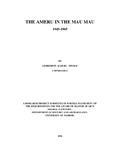| dc.description.abstract | The objective of this study was to find out the role of the Ameru in the Mau Mau struggle for Kenya’s independence. In particular, the study undertook to investigate the factors that influenced and sustained their participation in the Mau Mau, to examine the role played by the Ameru women in the struggle and to assess the impact of the Mau Mau movement on the Meru community.
The written history of the struggle for Kenya’s independence so far appears to be selective. Whereas a lot has been written about the Kikuyu, the Ameru are the least covered despite their involvement and contribution to the struggle right from the early years up to the attainment of independence in 1963. Apart from the rather casual mention of Meru, as part of the Kikuyu, these studies have tended to create a general impression that Mau Mau struggle was an exclusively Kikuyu affair.
The theoretical framework is based on Abraham Maslow’s human basic needs. These are the “deficiency needs” and “growth needs”, as explained in his work “Human Basic Needs Theory”. Colonization impoverished the Africans by adversely affecting the attainment of their basic needs; hence their violent uprising against the colonial administration. The study has the following hypothesis: The Meru played an important role in the Mau Mau struggle for Kenya’s independence; the Ameru women played an important role to sustain the struggle; and Mau Mau movement had a significant and long lasting impact on the Ameru, as a community.
The methodology applied in the study comprised the use of secondary and primary sources, together with library research and field work. The data collected was analysed qualitatively. This approach was found to be more appropriate as it made it possible to use various historical sources colloboratively.
The following are the main findings of the study. The Ameru had their own grievances arising from the introduction of the oppressive colonial administration in their region. Right from the beginning the Ameru were suspicious of the white man’s true intentions and they expressed their mistrust in several traditional songs. The white man’s oppression included forceful alienation of part of Ameru land (Buuri area) for European settlement. Colonial administration also disrupted and negatively affected the Ameru traditional way of life and they had to fight against such oppression. The number of Ameru freedom fighters, including those in the senior ranks of Field Marshal, General, Brigadier, Major and Captain is a clear evidence of the Ameru’s active participation in the struggle. There were other
xi
fighters in the lower ranks as well. The various roles played by the Ameru women, both inside and outside the forest, was a crucial factor in sustaining the struggle for its entire duration.
The Ameru participated in both the Mau Mau movement (freedom fighters) and in colonial forces that fought against it (loyalists). Such participation affected the community’s way of life politically, socially, culturally and economically. Some aspects of that impact were negative and others posititive, depending on which side one supports. Deep-rooted bitterness and suspicion still exist between the ex-freedom fighters and the ex-loyalists.
Plagiarism | en_US |



